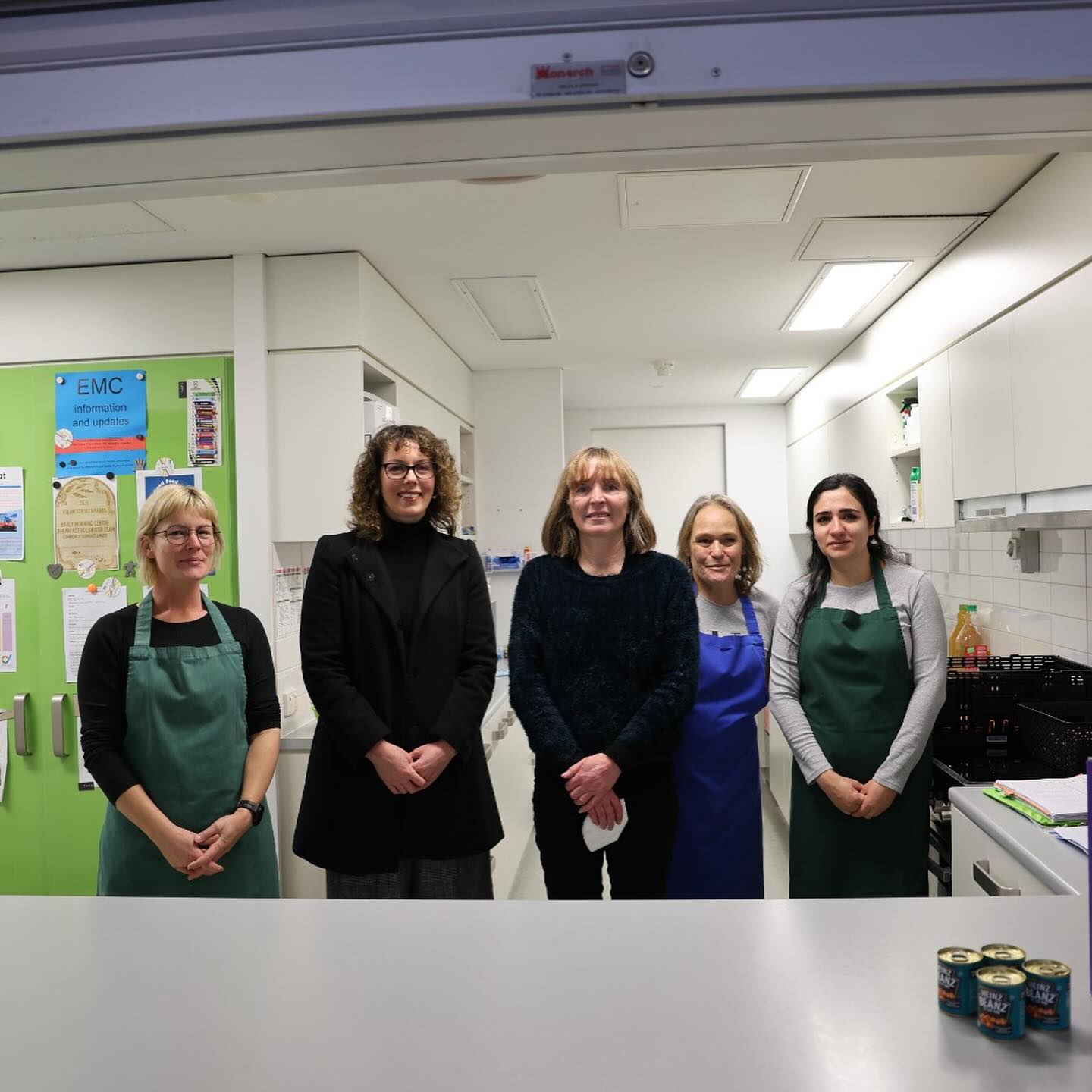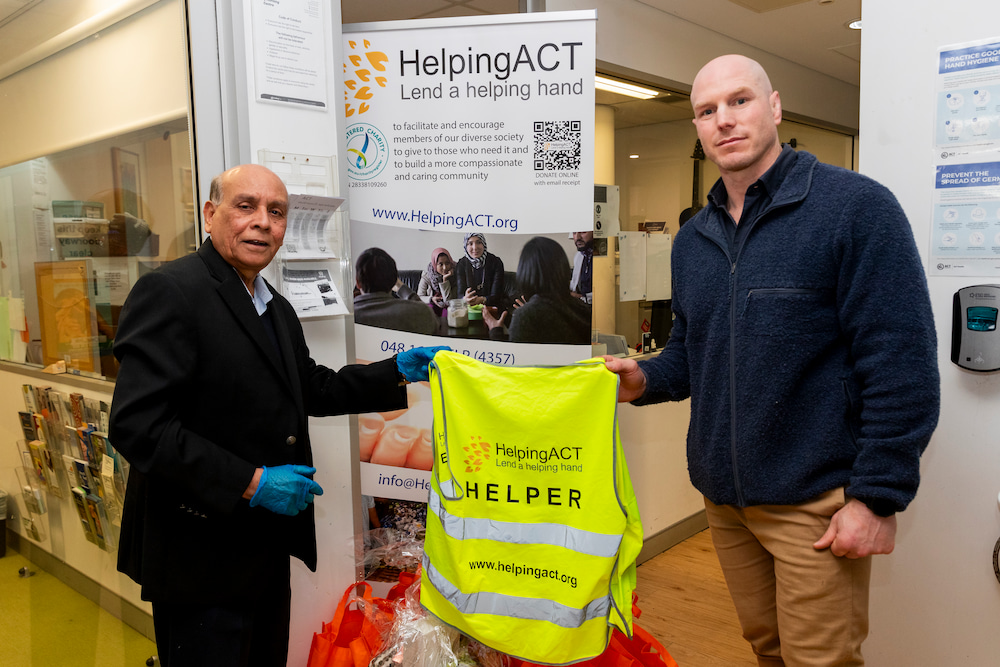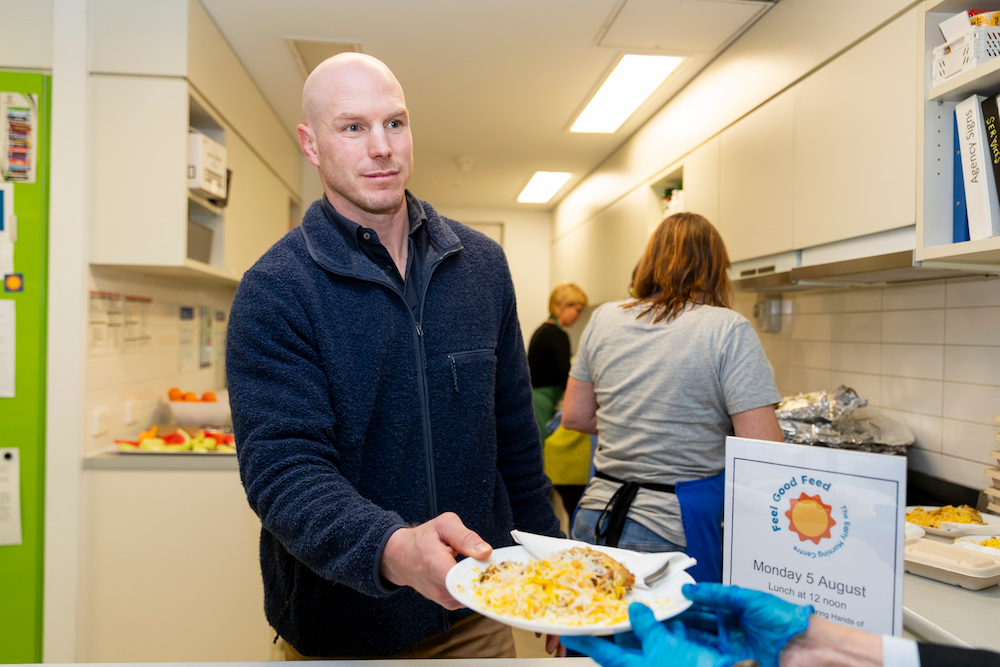Once a month, food relief charity HelpingACT hosts lunch for homeless people at the Early Morning Centre, the support centre on Northbourne Avenue. This Monday, however, was a special occasion: to mark Homelessness Week, Independent Senator David Pocock served lunch to the centre’s clients, and talked to them about their problems.
“It’s the same tragic stories about not being able to find housing, being on waitlists, people in crisis not being able to get the support that they need, and pleading for a better system, where they’re not on a waitlist for years for social housing,” Senator Pocock said.
“It’s something that we absolutely can prioritise and make good strides towards addressing. From what I’ve seen, I don’t think there has been the political will and then the funding and wraparound services that are needed to actually make it happen.”
Forty thousand people are struggling in Canberra, says Helping ACT president and founder Mohammed Ali, while 1,400 to 1,500 people are sleeping rough every night.
2023 data states that the rate of homelessness in the ACT decreased from 48.7 (second highest nationally) in 2011 to 40.2 (fourth lowest nationally) in 2016 to 39.1 (second lowest nationally) in 2021. But homelessness is getting worse every day, the Early Morning Centre states.
Homelessness, Mr Ali says, has increased from around 1,300 a couple of years ago – people who need food and shelter, their physical and mental health needs to be met, and human dignity.
“These people need not just a Homelessness Week, but for the whole year, they should be in our mind,” Mr Ali said. “We have to work collectively to alleviate this disease in our society.”
Some of them are children: 900 children sought assistance from homelessness services in 2022–23, according to a report published earlier this week; nearly 400 could not be helped – a fact that Mr Ali says makes his heart bleed. He urges anyone who comes across a family with suffering children to “take them into our fold … and start helping the family”.
“The talk you hear in the federal parliament is just how wealthy the ACT is,” Senator Pocock said. “Yeah, it’s an incredibly wealthy jurisdiction – but we know that the high average wage glosses over so many people doing it tough.”
More than 3,000 people are waiting up to five years for housing; Canberra Hospital staff are living in caravan parks because they cannot find anywhere affordable; and recipients of welfare payments like JobSeeker or Youth Allowance cannot afford to live in Canberra.
“Housing is one of the biggest challenges we’re facing,” Senator Pocock said; “it’s at the core of some of this intergenerational inequality that we’re seeing, that is unfortunately growing, and underpins a lot of the cost-of-living crisis, where people are spending 40 or 50 per cent of their take-home pay on rent or on their mortgage… What I’m hearing from people is that they want this dealt with; they want this solved.”
Senator Pocock is calling for more funding and more ambition to address the housing and homelessness crisis in Australia. He and Kylea Tink MP recently introduced a bill that would require the Federal Government to treat adequate housing as a human right for every Australian, introduce a legislative framework to hold governments accountable, and make a 10-year plan to transform Australia’s “dysfunctional” housing system. More than 100 housing organisations, academics, and former politicians support his bill.
Labor MP Alicia Payne visited earlier in the day to speak with the Centre’s director, Nicole Wiggins, volunteers, and guests. She has been a long-term supporter of the centre: she regularly volunteered there, and bought them a barbecue.

“The Early Morning Centre is a wonderful organisation that provides food, vital services, and community for those who are experiencing homelessness,” Ms Payne said.
The Centre serves daily breakfasts and lunches several times a week, offers showers and laundry, phones and internet, alcohol and drug counselling, a vet clinic, and accommodation support, as well as a current affairs discussion group, cooking classes, and an arts and crafts group. It has been called “a lifesaver” for homeless Canberrans.
“Canberrans are concerned about homelessness, and constituents frequently raise it with me,” Ms Payne said. “Canberra is an altruistic community, and people are concerned to see others doing it tough, and believe that in a wealthy country like ours, no-one should be without a safe place to call home. The Early Morning Centre, which is predominantly staffed by volunteers, is a great example of our community coming together to support those experiencing homelessness. But people also expect government to play an important rôle in preventing homelessness.”
The federal Labor government, Ms Payne said, has made housing and addressing homelessness a key focus. It is boosting the supply of public and social housing and of affordable housing through agreements with National Cabinet, such as the National Housing Accord ($350 million for 10,000 rental homes by 2029); the Social Housing Accelerator ($2 billion for 4,000 new social homes); the Housing Australia Future Fund ($10 billion for 30,000 new social and affordable rental homes); and the National Housing Infrastructure Facility ($1.6 billion in social and affordable housing); increased Commonwealth Rent Assistance by 15 per cent, the biggest increase in 30 years; is developing a new National Housing and Homelessness Plan; and established the National Housing Supply and Affordability Council. Both the ACT and Federal Governments have signed the National Agreement on Social Housing and Homelessness, which (nationwide) includes $400 million per annum specifically for homelessness.
“In a country like Australia, everyone should have a safe place to call home,” Ms Payne said. “It’s important to understand that anyone can find themselves in these situations, and government policies are a critically important part of addressing and preventing homelessness and poverty. …However, there is still more work to do, and our Government is up to the challenge, doing more than any other government has done to end homelessness.”
But Senator Pocock believes that what Labor is doing is not enough; in his opinion, Labor’s programs and funds are good, but too small-scale.
“I don’t think we’re seeing the scale of ambition that’s going to be required to actually deal with the housing and homelessness crisis,” he said.
“To their credit, they’ve got a raft of policies. I think they really lack ambition. The scale of them is barely touching the sides, and that’s a real frustration for me. It’s all good to have policies and programs that are set up, but if they are nowhere near the scale that’s required – nice to have them, but we’re not actually going to solve this, and none of them deal with some of the root causes of the housing crisis.”
Senator Pocock argues that the lack of affordable housing is due to policies and programs not being scaled up enough to address root causes, and that the wealth divide will worsen without meaningful changes.
The tax system treats housing as an investment more than as something that should be a human right and affordable for everyone in the community, he remarked. Senator Pocock is calling for reforms to tax concessions on investment properties (capital gains tax discount and negative gearing); modelling from the Parliamentary Budget Office shows that could boost housing affordability, rates of home ownership, and deliver up to $60 billion in savings to the Budget over a decade. “We’ve got to talk about tax – and the major parties run away from discussions about tax,” Senator Pocock said.
He is pushing for more investment in social and affordable housing and frontline services. The federal government, he says, has not renewed funding for Homelessness Australia or National Shelter.
He also wants the government to double the size of the Housing Australia Future Fund; the first round was “wildly oversubscribed”: the government expected 30,000 applications, not the 50,000 it received. Senator Pocock says he got the government to add indexation ($6 billion additional funding) to the HAFF.
However, Senator Pocock believes the ACT Government has too often taken “a pretty slow, unambitious approach”. For instance, it did not show “the same enthusiasm and preparedness as some of the other states to get in the queue for money” from the HAFF. Likewise, it received $50 million through the Social Housing Accelerator Fund to spend within two years – “use it or lose it money” – but Senator Pocock believes there has been little action. He is also concerned by the lack of maintenance of social housing stock – which he attributes to lack of funding. The ACT Government, however, invested $80 million in the Affordable Housing Fund (a $20 million increase) to grow affordable rental properties by 600, and $6.5 million to expand homelessness support.
“If you start talking about ending homelessness, some people say, ‘Well, that’s utopian thinking, that’s naïve’. But if you look to some of the Nordic countries, they’re well on the way, or they’ve done it – and their experience shows that it’s actually cheaper to have people housed and have support systems around them than it is to have people living on the street. So why wouldn’t we make that decision? …
“We can certainly start to turn the ship around, but it’s going to take some political courage. … There’s no silver bullets, but it just takes some vision and some ambition, and then ultimately prioritising funding into these areas.”
Mr Ali thanked Senator Pocock for coming to the lunch.
“For a person like [Senator Pocock] who is so busy to find time for homeless people, for Helping ACT, and for the Early Morning Centre is wonderful,” Mr Ali said. “I sincerely thank him and his office for coming and being part of the whole crusade against poverty and homelessness.”

.



